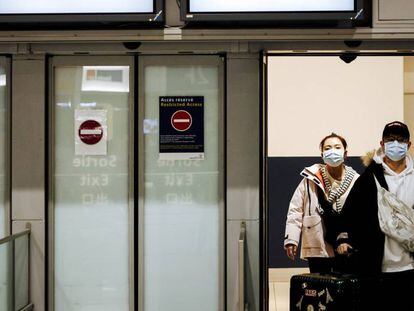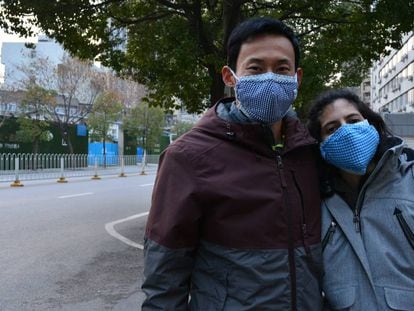Life in Madrid’s coronavirus quarantine
EL PAÍS correspondent Jaime Santirso, who was one of the 21 Spaniards evacuated from Wuhan, describes his ongoing isolation in a military hospital in the Spanish capital
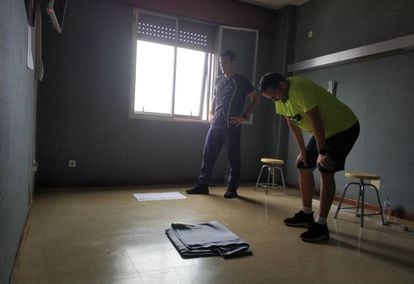
On Friday, January 31, a group of 21 Spanish citizens who were trapped in the Chinese city of Wuhan, the epicenter of the novel coronavirus – technically known as 2019-nCoV – arrived at the Torrejón de Ardoz airfield in Madrid. From there, they were taken to the Gómez Ulla military hospital, where they are due to spend a total of 14 days in quarantine.
EL PAÍS correspondent Jaime Santirso, one of the Spanish evacuees, describes what the first four days of quarantine have been like.
Day One
Sometimes you leave home with a suitcase to report for four days on a new virus in Wuhan, and you end up writing about a quarantine in Madrid, dressed in pajamas on Floor 17 of a military hospital.
Our first day started early. Jet lag meant that our floor was soon filled with life, with several people breakfasting together in the waiting room. A few hours later, the hospital’s chief doctors came to greet us. After introducing themselves with name and military rank, they had two basic messages for us: “You are not sick,” and “You have gone through a terrible situation, turn to the group for support.”
Then the first family visits began. Each one of them lasted half an hour: 20 minutes together and 10 minutes to put on protection gear, which includes a face mask and a surgical robe. A space for the visits has been created in the center of the floor, with two white screens giving a false sense of privacy. The families and the evacuees are kept two meters apart and cannot have any physical contact. Others opt for more extreme precautions and speak through the door.
Day Two
Moses brought down ten commandments to the children of Israel, and the head of the military hospital has brought down a document with 12 points regarding the code of conduct during our stay here. The plan has been designed on the fly – this is also an unprecedented situation for the doctors, who treat us kindly.
The sun rises and through the window, you can see the Madrid neighborhood of Carabanchel. It is a reality check for those of us who, with noses pressed against the windows, still don’t quite understand where they are or how they came to be here.

It’s mid-morning and as if by magic, one of the empty rooms has been transformed into a gym. The miracle has been achieved with a pair of chairs, some blankets on the floor and a crossfit program adapted by Cristina, the sister of patient Antonio Sevillano. Loud music plays from the speakers as they take turns in two, due to the small size of the room. I ask one of them if I can take a photo. “Of course, we’re almost like family,” they reply.
In the afternoon, there are more family visits. Lots of mothers, fathers, partners, sons and daughters pass through the hospital floor. They bring things for their loved ones. The only rule that must be respected is “what comes in can’t go out,” meaning that two removal trucks may be required when our floor is cleared in two weeks’ time. Patients’ eyes light up when one of their fellow interns says they are willing to share their package of cheese, chorizo and other Spanish sausages.
After the visits, when the tension is released and a tear or two shed, the patients support one another.
Day Three
“The use of face masks, waterproof robes and gloves is not necessary, but they are available if you would like to use them.”
The face masks are taken off as soon as this point is read. We are freeing ourselves of a muzzle that has covered our face day and night for the past few weeks. All except the youngest of our group, who has not yet turned one and is too small to fit any face mask. Throwing the masks into the bin is celebrated with a sigh of relief.
We have been told to cough into the nook of our elbow, but up until now no one has broken into a coughing fit. What has been heard, for the third consecutive night, are screams from the floor below. “I thought they were taking one of us to the isolation area,” says one patient, after confirming that no one is missing.
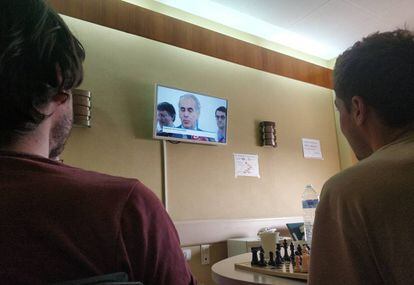
Hospitals are for the sick, but we respect the following principle: in medicine like in law, everyone is healthy until proven otherwise. The fundamental indicator of this is our temperature, which is punctually taken three times a day: “36.5ºC, impeccable.” We congratulate one another.
Meanwhile, Cristina’s crossfit program continues to win fans. Other patients choose instead to go for a slow walk down the 64-meter long corridor. This is a measurement provided by Pedro Morilla, a soccer coach who is accustomed to checking the distance on pitches so he can adapt his team’s strategy. Cristophe is also keen to exercise, because even though he is over 60, he is worried he might let himself go with hospital food. The patients find the food delicious and sing its praises before the hospital workers’ stunned faces. “They must have eaten terribly in China,” whisper the employees to one another.
There is a strange double reality on the floor. People come together to watch the news stories about themselves. Through the window, you can see the journalists reporting live from outside the hospital. Some of the patients also send videos to the television channels about their life here. Since the virus outbreak, they have spent a lot of their time giving interviews. It was important for their call for help from Wuhan to be heard. Now, in Madrid and without a face mask, a happy ending is increasingly close.
Day Four
“This is all very exciting, you know?” The Polish-Spanish violinist Christophe Blezien is standing in front of the window, gazing down at the streets of Madrid and reflecting on his situation.
“I wasn’t born here, but I’ve been living here since before you came into the world,” says the sixty-something, pointing at my chest with a finger that has the ability to extract the most melodious sounds from all kinds of instruments. “And seeing so many people deployed here to help us, to welcome us... It’s exciting.”
Christophe is not pleased with the humorous tone of this diary, which is being published daily in EL PAÍS. “We are not here because we like it, but to fulfill a duty. We went through an extreme situation and we barely made it out. Humor is one way to deal with it, but I wouldn’t wish this on anybody,” he says.
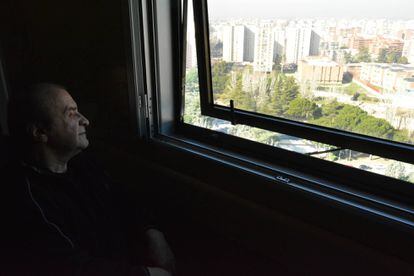
It is true that the exceptional conditions of life on Floor 17 of the Gómez Ulla military hospital provide opportunities for irony, which is indeed a way to deal with the prolonged confinement. But I would not want to come across as frivolous, either: some people are having a hard time. “I’m exhausted yet I can’t sleep at night,” says the musician. “And I am not the only one: last night, after tossing and turning in bed, I went out for a walk in the hallway. It was two in the morning, but I ran into three other people.”
I met Christophe on January 30, inside the car that took us to the airport for our evacuation flight home. The first thing he said is: “I’m hungry.” A professional musician who travels all over the world to play violin recitals and teach, he was in the Chinese city of Wuhan for precisely that reason. He should have taken a flight out at 1pm on January 23, but authorities imposed a lock-down three hours before that, leaving him stranded in the city. “I found myself in a house that wasn’t my own, in a country that wasn’t my own, with a language I don’t understand and a kitchen containing just one kilo of rice, two carrots and a liter of oil.”
The pangs of hunger took him back to his student days at the Moscow Tchaikovsky Conservatory, alma mater of some of the best musicians in the world, where he and his friends would share a loaf of dark bread and a single slice of cooked ham. At his recitals, Christophe plays one of the world’s few remaining Stradivarius violins, which is the property of the Rockefeller Foundation. He says he doesn’t miss the daily practice. “At this point in my life, it’s all in here,” he says, pointing at his wrinkled forehead. Right now he is listening to Eugène Ysaÿe’s Sonata No. 4 inside his room, and dreams of a glass of cognac and going for a walk.
English version by Melissa Kitson and Susana Urra.
More information
